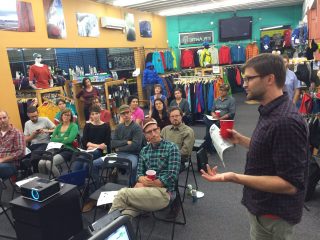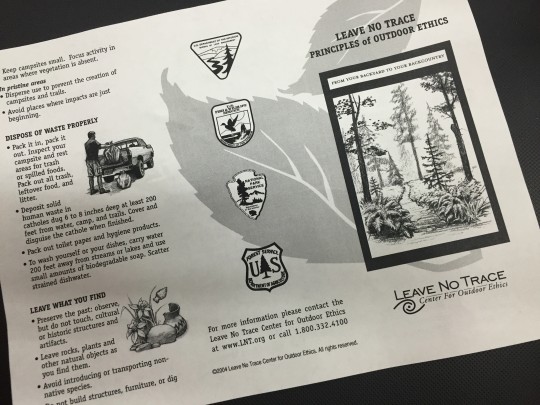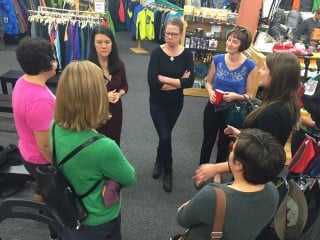Leave No Trace ethics aren’t something we talk much about in the bike world. But we should.
As “gravel riding” and “bikepacking” skyrocket in popularity, everyone promoting it (I’m raising my hand) has a responsibility to make sure people who do it act with care and consideration for each other and the places they visit.
It was in that spirit that I joined Jocelyn Gaudi from the Komorebi Cycling Team, Gabe Tiller of Limberlost, and Donnie Kolb of Velo Dirt and OregonBikepacking.com last night at Mountain Shop. Our event came on the heels of two major bits of bad publicity last year: Donnie’s frustrated rant after people left trash and human waste along the Oregon Outback route and the story of that guy in Idaho who caused a wildfire after using flames to dispose of his soiled toilet paper.
In front of about two dozen people (over half of which were women, encouragingly) we set out to right those wrongs. I’m a dwarf among those three giants of adventure riding, so I spent most on the night just trying to soak up all their wisdom and insights.
Here’s what I learned:
Human Waste
— Peeing on rocks is preferable to going on trees or shrubs because it’s less likely to attract wildlife — some of which, as in the case of mountain goats apparently, are so eager to lick up your salty urine they sometimes don’t even wait for you to finish before lapping it up.
— A small and lightweight trowel is a must-have when you need to go poop. Dig a “cathole” 6-8 inches (“It’s deeper than you think,” Jocelyn said last night), do your business, then cover it back up with the dirt.
— If possible, just wait until you can use a real toilet in the next town you come to.
— Consider carrying a plastic bag with some kitty litter in it. Or, carry a few Ziploc bags: one for your trowel, one for soiled TP, one for fresh TP.
— There are also lightweight, ready-to-go plastic bag kits you can get from an outdoor store. Mountain Shop sells the Cleanwaste brand.
Advertisement
Food Waste
— Before you leave, repackage all your food stuff into Ziploc bags so you avoid all the original packaging.
— Don’t wash dishes in streams or lakes. Use a spatula or rag to remove the big chunks and carry a screen that allows you to put them in a trash bag.
— Try not to have any food waste to begin with. “How do you do that?” Jocelyn asked Gabe. “Just eat everything!” he replied with a smile.
— Or, if you are really hardcore, swish a bit of water around on your dirty dishes… then drink it up!
— Tiny silicone spatulas or good, old-fashioned tortillas are both good for wiping dishes clean without using water.
Campfires
— Consider not having one. During a recent burn ban, Jocelyn said she and friends were forced to sit in the darkness. And it was actually quite nice.
— Don’t burn anything in the fire except wood. And maybe coffee grounds (which is all Gabe burns). No plastic or food labels or beer cans.
— Use water to put out the flames, not dirt or rocks. Embers can remain under soil.
— If you’re in a place with lots of loamy soil or organic matter, wipe it all away before starting your fire. One person from the audience shared that he once accidentally started a ground fire that popped up several feet away from the original one because the ground was so full of flammable material.
— Don’t create new fire pits. Use existing ones. Or better yet, build your fire on a shoreline when possible or on a rock — places where you can wipe it away and leave no trace when you’re done.
Isn’t all this stuff just common sense? One guy spoke up last night and made a good point: “The problem with common sense is that we don’t all have common experiences.” What he meant was that we can’t assume everyone just knows how to act in nature because we all come from different backgrounds.
Another thing that has stuck with me from last night is something Jocelyn said: “Great campsites aren’t made, they’re found.”
The general idea when you’re out and about is to leave places exactly like they were when you found them. Or in some cases, leave them looking better than when you found them.
Last night’s event was the start of a new conversation about the importance of Leave No Trace that we all hope continues as the adventure riding season heats up again next spring. Speaking of which, we’re already planning a larger event at Mountain Shop in May. Stay tuned.
And thanks to everyone who came out last night. I have a feeling #leavenotrace will be the hot hashtag next spring.
— Jonathan Maus
jonathan@bikeportland.org
(503) 706-8804
@BikePortland




